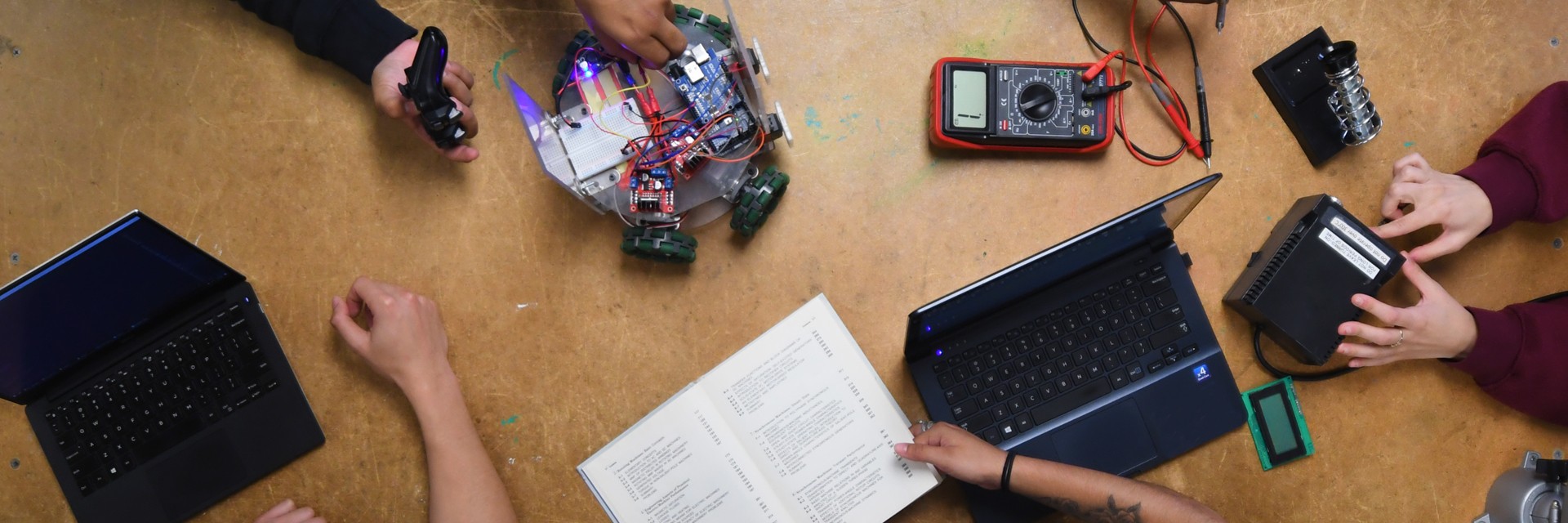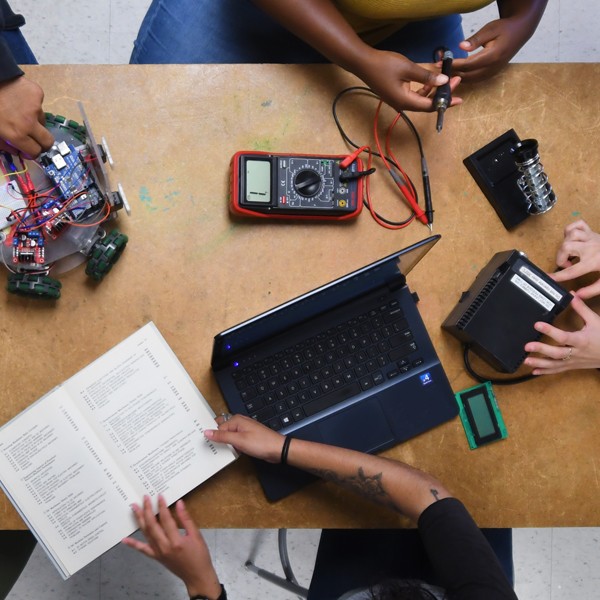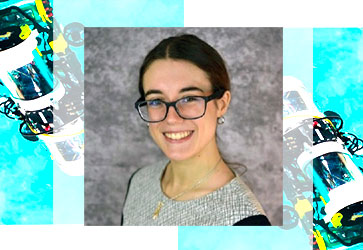ECST Graduate Hones Real-World Skills in Submarine Competition
Photo: Sidra Gibeault
“I’m a chronic planner,” says Sidra Gibeault, a 2020 graduate of ECST with a degree in Electrical Engineering.
That’s probably just one reason Sidra was chosen to co-lead ECST’s RoboSub team for 2020 along with Joseph Iorio, a 2020 ECST graduate with a degree in Mechanical Engineering. RoboSub is an international competition sponsored by the U.S. Office of Naval Research that challenges universities around the world to create an Autonomous Underwater Vehicle (AUV) that can perform a series of specified tasks underwater. The underwater vehicle must demonstrate its autonomy by navigating through an underwater course to touch buoys, navigate a channel, drop a marker, fire torpedoes, retrieve an object, surface, and release the object.
Designing an AUV for the competition requires months of design work and testing by a multidisciplinary team of Electrical Engineering, Mechanical Engineering, and Computer Science students. For the competition itself, teams gather once a year for a week to demonstrate their vehicles with the hope of being one of the six teams to qualify for the finals. During the finals, each team is given a nail-biting 20 minutes to put their subs in the water, run them through their paces, and see if they sink or swim.
Sidra first learned of the RoboSub competition during her second year at Cal State LA. She had begun her studies at the age of 13 through the university’s Early Entrance Program, designed to permit young, highly gifted students to enroll in college as full-time students. Sidra admits she wasn’t quite ready for college at that age. Still, she took it to heart when one of her professors suggested that she look at some extracurricular activities so she’d have something on her resume beyond academics.
“What drew me to RoboSub was how hard it was going to be to build a submarine,” says Sidra. “I liked the idea of figuring out how to do something so complex. As I got into it, I also became hooked on the feeling of achieving things.”
According to Dr. Mark Tufenkjian, Professor and Chair of the Department of Civil Engineering, “To build an AUV for a RoboSub competition, students must get outside their fields of study and their comfort zones, learn how to use each other’s expertise, and work together. The whole year is taxing, and the weeklong competition is grueling, both physically and emotionally. But students love it. It sets them up for future success.”
As co-leaders of the 2020 RoboSub team, Sidra and Joseph tackled the monumental task of organizing and managing the work of a multidisciplinary team of 30-40 students. They had both been team members for the previous three years and had learned a few things they believed could improve the experience for team members and result in a better design. Says Sidra, “From our past experience, we knew that team members want to get engaged in hands-on work from the beginning. No one joins the RoboSub team to do research and write papers. So, we started out with workshops on topics like learning how to use the design software and completing small tasks that people could do right away. That helped a lot.”
They also made communications a top priority, holding team meetings every week and making sure that everyone got a chance to present what they were working on to the entire team. “It’s hard to be productive when you don’t know what’s going on,” says Sidra.
This past year was to be ECST’s fourth entering the RoboSub competition, participation made possible by a $540,000 grant from the U.S. Office of Naval Research. Unfortunately, the team’s work was halted when California issued shelter-in-place orders in March due to the coronavirus pandemic and team members could no longer gather to work on the project together. “We had a week left of manufacturing that was supposed to be completed at the end of March and testing should have started in April,” says Sidra.
The RoboSub in-person finals typically take place in August. But in May, all in-person activities of the RoboSub competition were cancelled and teams were invited to submit documentation of their designs and progress online. As of this writing, a date and time for an end-of-summer virtual gathering to announce prizes and prepare for 2021 had not been announced.
Despite the disappointment of having the in-person RoboSub 2020 competition cancelled, Sidra has no regrets about the work she and other team members put in on the project during the year. “I think being involved in activities like RoboSub make you more desirable after graduation because you gain skills that are valuable in the workplace,” says Sidra. “I learned a lot about leadership, managing people, and how systems work. I would encourage all students to take on extracurricular activities that give them these kinds of skills.”
Now 18-years old, Sidra graduated in May, had a summer internship at NASA Jet Propulsion Laboratory in Pasadena, and this fall heads off to the University of Maryland, College Park to start a PhD program in Electrical and Computer Engineering with full funding and a paid position as a graduate teaching assistant.


